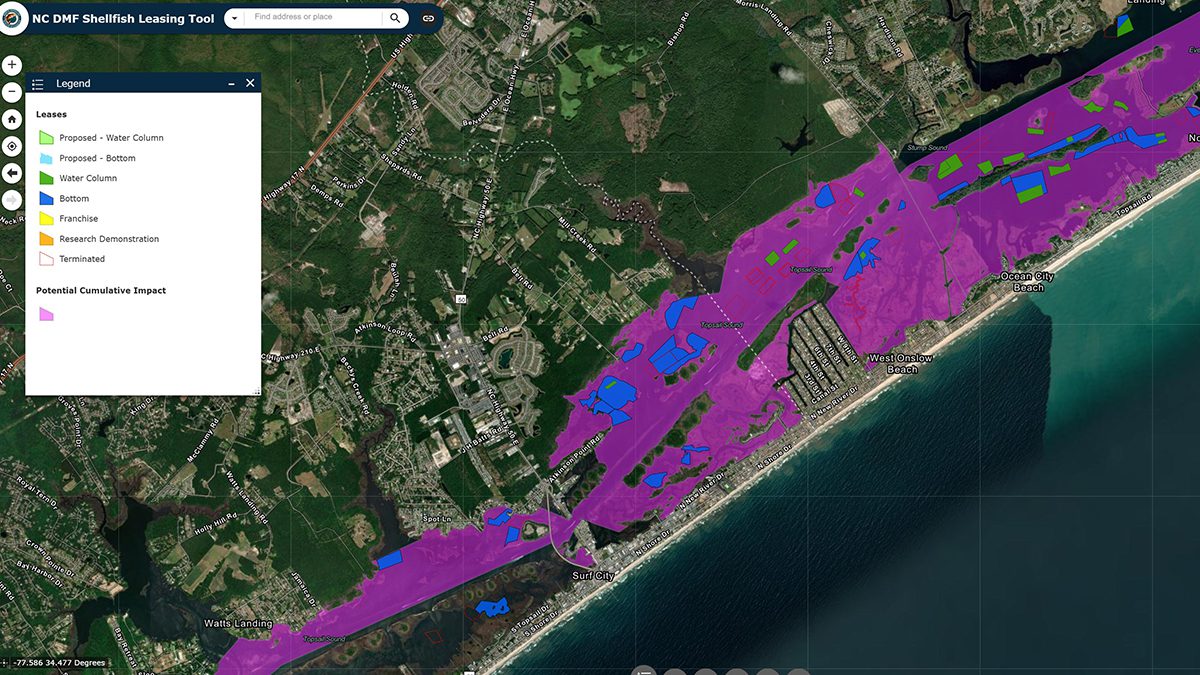Moratoriums threaten aquaculture, environment, say farmers
April 23, 2025

Not much has changed in the saga surrounding shellfish farming in coastal waters of Onslow and Pender counties.
That was made clear during a public hearing Tuesday night in the little town of Holly Ridge in Onslow County, where Topsail Island-area residents and aquaculture farmers took turns speaking about the prospect of more shellfish leases in the area.
Perhaps the one consensus among those who oppose additional leases and those who hope to raise shellfish in them is that they are where they are because new leases are not allowed in waters of neighboring coastal counties to their north and south.
Shellfish moratoriums in waters from Cedar Island south to Brunswick County have essentially funneled growers to waters around Topsail Island, prompting what has become an unceasing push to get the state to pump the brakes on new leases in Onslow and Pender counties.
Within the span of one week, the North Carolina Division of Marine Fisheries held two public hearings – one in Pender, the other in Onslow – on lease applications for shellfish farms that would collectively take up more than 30 acres.
That’s more than double the total acreage of shellfish leases in nearby New Hanover County, Topsail Beach resident Tate Tucker said during the Tuesday night hearing, where he reiterated comments he had made at a public hearing in Pender County the previous week.
“Like I said last week, say this whole Eastern Seaboard of oysters is a boat. We’re the hole in the boat, right? And they’re filling it just as fast as they can with leases, as much as they can. I don’t think we can keep going like this if we don’t have an organized plan. If we don’t fill that hole, the boat’s going to sink,” Tucker said.
The Topsail Island Shoreline Protection Commission, or TISPC, which is composed of elected officials from each of the island’s three towns — Topsail Beach, Surf City and North Topsail Beach — has since last year called for a temporary moratorium on new shellfish leases. County officials in Onslow and Pender have made the same request.
“As a commission, we have become increasingly concerned about conflicts between shellfish leases and other uses of our natural resource waters that include commercial and recreational fishing, boating, kayaking and other coastal land and water uses, not to mention the potential impacts on property values and esthetics,” TISPC Chair William Snyder said.
On April 10, Rep. Carson Smith, R-Pender, introduced legislation that would require a statewide study on shellfish leasing and the current lease moratoriums.

Under House Bill 841, the North Carolina General Assembly-created North Carolina Policy Collaboratory would evaluate everything from existing leases and the history and reason for current permanent and temporary moratoriums to economic impacts of shellfish aquaculture expansion on coastal economies and tourism, and the different potential environmental impacts of bottom leases and water column leases.
A final report of the study would be due to legislators by May 1, 2026.
Chris Matteo, acting president of the North Carolina Shellfish Growers Association and East Coast Shellfish Growers Association vice president, said Tuesday that the legislation “thankfully” does not call for a moratorium in Onslow and Pender counties.

He also said the measure is unlikely to pass.
“There’s been plenty of impact studies done over the course of time and, quite frankly, this area may be relatively new to intensive aquaculture, but the rest of the East Coast and West Coast of this country, it’s been in play for a very long time and the positive impacts are irrefutable,” Matteo said.
As he had in previous public hearings, Matteo suggested that residents and local leaders ask state elected officials to lift moratoriums on shellfish leases in other coastal counties.
He rebutted comments made by others who spoke at the hearing that shellfish farms negatively affect property values.
Nelson Bullock, who started Gator Bay Oyster Co. with his wife, mirrored sentiments of other shellfish lease applicants who argue shellfish farming is beneficial to the environment.
The Bullocks have applied for a 3.82-acre shellfish bottom and water column lease in Onslow County’s Ellis Cove.
“I’ve been involved in oyster farming for over 14 years now and have witnessed firsthand all the positive impacts of shellfish aquaculture on both the environment and our communities,” Bullock said. “Oysters naturally filter and clean the water. They create habitat and they also help stabilize the shoreline. Shellfish farming is one of the most sustainable forms of aquaculture offering significant ecological and economic benefits.”
Bullock said he was committed “to being a good neighbor in the water.”
John Eynon, owner of Big Cypress Mariculture, said he understands concerns raised by some local fishermen, who argue leases impede access to fishing spots around the island.
“I’m more than happy to talk with people and try to figure out how I can mitigate whatever those impacts might be, whether it’s by using certain gear types, positioning these gear in certain places, orienting in a certain way,” Eynon said.
He has applied for a 2.73-acre bottom and water column lease in Sneads Creek, a location he said he picked because it is “tucked away.”
“It’s not a navigational hazard,” he said. “It’s not impacting anyone’s views, which I know have been issues with other lease proposals.”
TISPC Vice Chair Larry Strother, who also chairs North Topsail Beach’s Beach, Inlet and Sound Advisory Committee, reiterated that the concern raised by the island towns is that more studies need to be done before additional leases are permitted.
“There are some leases that are going to affect the recreational activity, the fishing and everything else that takes place around the island, which is what we provide when we represent the recreation part of our beach,” he said. “We just want to make sure that our recreational activities and our fishing that’s been going on for all these years is going to be able to continue and cohabitate with the leases. We’re not opposed to shellfish leasing. We are opposed to not having it studied.”
Search
RECENT PRESS RELEASES
Related Post



